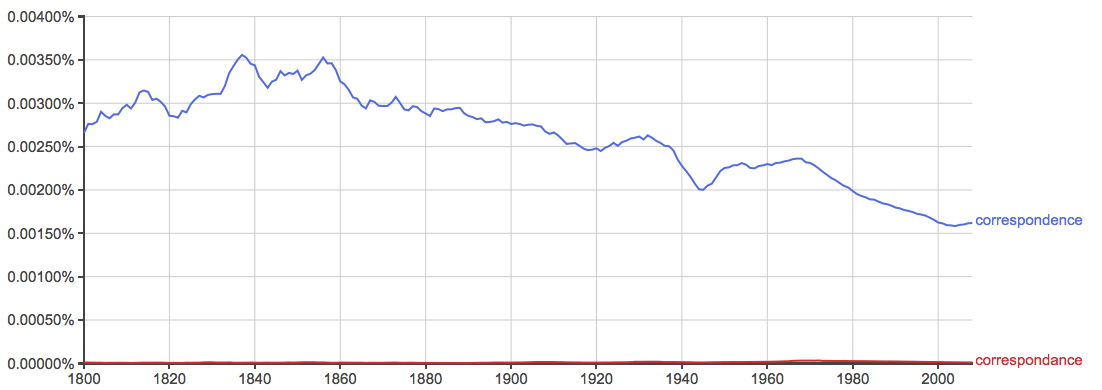English has many confusing words. Some of them are different parts of speech, but some of them boil down to common spelling errors, like correspondence and correspondance.
Only one of these spellings is accepted in English. The other, however, just so happens to be a word in French.
It just so happens that in the 14th century, English borrowed the word from French, which had borrowed it from the original Latin.
As fascinating as etymology can be, most English writers don’t write in French, so it’s only necessary to know the correct way to spell this word in English.
What is the Difference Between Correspondence and Correspondance?
In this article, I will compare correspondence vs. correspondance. I will outline the correct spelling and when it is appropriate to use it.
Then, I will give you a useful memory tool that will help you decide whether to use correspondence or correspondance, depending on what language you are using.
When to Use Correspondence
 What does correspondence mean? Correspondence is a noun. It means communication over a period of time, especially via the written word.
What does correspondence mean? Correspondence is a noun. It means communication over a period of time, especially via the written word.
Here are some examples,
- My correspondence with the senator did not result in meaningful policy change.
- “You are to cease all correspondence with the victim,” read the court order.
- Over the course of our correspondence, my husband said “I love you” only three times in a six-year span.
- By mutual consent, the two never met. Yet their correspondence bears all the hallmarks of a love affair; the texts, like his art, are rife with the effusive emotions of the Romantic era. –The Wall Street Journal
Correspondence can also refer to a close similarity, especially in statistical or scientific analysis.
For example,
- The predictable correspondence between antecedent and behavior, even when controlling for outside variables, is astounding.
Correspondence is actually a loanword from Old French; the French version was itself derived from Medieval Latin. According to several dictionaries, its first recorded use in English was in the year 1529.
When to Use Correspondance
 What does correspondance mean? Correspondance is not a word in English. It is, however, the French language version of the word correspondence. See the following sentence as an example.
What does correspondance mean? Correspondance is not a word in English. It is, however, the French language version of the word correspondence. See the following sentence as an example.
- Cessez toute correspondance avec la presse.
In English, it reads “Cease all correspondence with the press.”
In addition to not being found in any English dictionary, correspondance is rarely used, if ever, by the general English-writing community.

As you can see from the above graph, which charts correspondance vs. correspondence, the spelling correspondance is used so infrequently in English that it virtually approximates zero.
Trick to Remember the Difference
 Still having trouble remembering correspondance or correspondence? Here is a helpful tip to remember the difference.
Still having trouble remembering correspondance or correspondence? Here is a helpful tip to remember the difference.
- Correspondence is a word in English.
- Correspondance is not and English word.
Correspondance is, however, a word in French.
Thus, if you are writing in English, use correspondence. If you are writing in French, use correspondance. As a memory tool, notice that correspondence shares its extra E with English, and correspondance shares its A with Paris.
Summary
Is it correspondence or correspondance? Correspondence is a noun. It can refer either to extended written communication or a close similarity.
- Correspondence is the correct spelling in English.
- Correspondance is a misspelling in English.
These words can be confusing, since the English correspondence is borrowed from the French correspondance, which had its origins in Medieval Latin. Luckily, correspondence and English are both spelled with the letter E. Correspondance contains an A, like Paris.
Languages other than English are outside the focus of what this site is designed to cover. Still, there are plenty of confusing issues in English to keep most writers busy. Be sure to check back next time you have a question on spelling or other writing topics.
Contents
